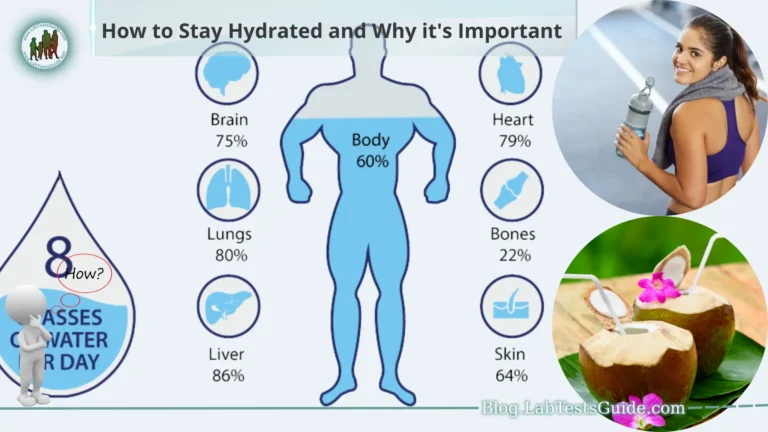The human body relies on a complex interplay of hormones to maintain optimal blood sugar levels. Two key hormones involved in blood sugar regulation are insulin and glucagon. These hormones work in opposition to each other to keep blood glucose levels within a narrow range. Learn essential tips and techniques to balance insulin and glucagon levels in your body. Discover dietary choices, exercise routines, and lifestyle adjustments to optimize insulin and glucagon for better metabolic health.

Insulin is produced by beta cells in the pancreas and plays a crucial role in lowering blood sugar levels. When blood glucose rises, such as after a meal, insulin is released into the bloodstream. It helps cells take in glucose from the blood, allowing them to use it as a source of energy or store it for later use. Insulin also suppresses the liver’s production of glucose.
What Is Blood Sugar Regulation and the Role of Insulin and Glucagon?
Blood sugar regulation refers to the body’s ability to maintain a stable level of glucose in the bloodstream. Glucose is the primary source of energy for the body’s cells, and maintaining an appropriate blood sugar level is crucial for overall health and well-being.
Insulin:
- Produced by beta cells in the pancreas.
- Released in response to high blood glucose levels, such as after a meal.
- Functions to lower blood sugar levels.
- Enhances glucose uptake by cells, especially in muscle and fat tissues.
- Stimulates the liver to store excess glucose as glycogen.
- Inhibits the liver’s production of glucose.
Glucagon:
- Produced by alpha cells in the pancreas.
- Released when blood glucose levels are low, such as during fasting or between meals.
- Functions to raise blood sugar levels.
- Promotes the breakdown of glycogen stored in the liver, releasing glucose into the bloodstream.
- Stimulates the liver to produce glucose through a process called gluconeogenesis.
How to Balance Insulin and Glucagon for Optimal Blood Sugar Control:
Eat a Balanced Diet:
- Include a variety of foods, including lean proteins, healthy fats, and complex carbohydrates.
- Opt for whole grains, fruits, vegetables, and legumes.
- Avoid excessive consumption of sugary foods and refined carbohydrates.
- Consider portion control to manage carbohydrate intake.
Monitor Carbohydrate Intake:
- Understand the glycemic index and glycemic load of foods.
- Spread carbohydrate intake evenly throughout the day.
- Consider counting carbohydrates to match insulin doses if you have diabetes.
Engage in Regular Physical Activity:
- Incorporate both aerobic exercises and strength training into your routine.
- Exercise helps increase insulin sensitivity and can promote glucose uptake by cells.
- Consult with your healthcare provider before starting or modifying an exercise regimen.
Manage Stress Levels:
- Chronic stress can impact blood sugar levels and hormonal balance.
- Practice stress-reducing techniques such as deep breathing, meditation, yoga, or engaging in hobbies.
Prioritize Sufficient Sleep and Rest:
- Lack of sleep can affect insulin sensitivity and lead to imbalances.
- Aim for 7-9 hours of quality sleep per night.
Medication and Medical Interventions:
- Follow prescribed medication regimens for diabetes management, such as insulin injections or oral medications.
- Consult with your healthcare provider for adjustments or modifications as needed.
- In some cases, glucagon administration may be necessary for severe hypoglycemia. Familiarize yourself with glucagon administration techniques if applicable.
Monitor Blood Sugar Levels:
- Regularly check your blood sugar levels using a glucometer or other monitoring devices.
- Track and record your readings to identify patterns and make necessary adjustments to your management plan.
Consult with Healthcare Professionals:
- Work closely with your healthcare team, including endocrinologists, registered dietitians, and diabetes educators.
- Seek their guidance for personalized advice, medication management, and ongoing support.
Maintain a Healthy Lifestyle Long-Term:
- Adopt sustainable lifestyle changes rather than relying solely on short-term fixes.
- Continually educate yourself about diabetes management and blood sugar control.
Understanding the Role of Insulin and Glucagon in Blood Sugar Regulation:
Here’s a closer look at their individual roles.
Insulin:
- Produced by beta cells in the pancreas.
- Released in response to elevated blood glucose levels, such as after a meal.
- Lowers blood sugar levels by facilitating the uptake and storage of glucose.
- Enhances glucose transport into cells, particularly in muscle and fat tissues.
- Promotes the conversion of glucose into glycogen for storage in the liver and muscles.
- Suppresses the liver’s production of glucose.
Glucagon:
- Produced by alpha cells in the pancreas.
- Released when blood glucose levels drop, such as during fasting or between meals.
- Raises blood sugar levels by stimulating the breakdown of stored glycogen.
- Triggers the release of glucose from the liver into the bloodstream.
- Promotes the production of new glucose through gluconeogenesis.
Factors Affecting Insulin and Glucagon Balance:
Here are some factors that can affect insulin and glucagon balance.
Diet and Nutrition:
- Carbohydrate intake: Consuming foods high in carbohydrates can trigger a release of insulin to manage the resulting increase in blood sugar levels.
- Protein intake: Protein-rich meals may lead to a modest release of insulin, as some amino acids can stimulate insulin secretion.
- Fat intake: Dietary fat generally has minimal direct effects on insulin and glucagon release, but high-fat meals can delay the absorption of carbohydrates and influence blood sugar levels.
Physical Activity and Exercise:
- Exercise intensity and duration: Physical activity can increase insulin sensitivity, leading to improved blood sugar control. The intensity and duration of exercise can affect insulin and glucagon release.
- Resistance training: Strength training exercises can improve insulin sensitivity and have a positive impact on blood sugar regulation.
Stress and Hormonal Imbalances:
- Stress hormones: During times of stress, hormones like cortisol and adrenaline can impact insulin and glucagon levels. Stress-induced hormonal imbalances may affect blood sugar control.
- Hormonal disorders: Certain hormonal disorders, such as polycystic ovary syndrome (PCOS) or growth hormone imbalances, can influence insulin and glucagon balance.
Medications and Medical Conditions:
- Medications: Certain medications, such as corticosteroids or beta-blockers, can interfere with insulin and glucagon levels, potentially affecting blood sugar regulation.
- Medical conditions: Health conditions like diabetes, liver disease, or hormonal disorders can impact insulin and glucagon balance, leading to blood sugar imbalances.
Sleep and Circadian Rhythm:
- Sleep deprivation and irregular sleep patterns can affect insulin sensitivity and impair glucose metabolism, potentially leading to imbalances in insulin and glucagon.
Tips for Balancing Insulin and Glucagon:
Here are some practical tips to help you achieve this balance.
Eat a Balanced Diet:
- Include a mix of macronutrients in your meals, including carbohydrates, proteins, and healthy fats.
- Opt for complex carbohydrates, such as whole grains, legumes, and vegetables, which have a slower impact on blood sugar levels.
- Prioritize lean sources of protein, such as poultry, fish, tofu, or legumes.
- Incorporate healthy fats from sources like nuts, seeds, avocado, and olive oil.
Portion Control and Meal Timing:
- Practice portion control to manage carbohydrate intake and prevent excessive spikes in blood sugar levels.
- Spread your carbohydrate intake throughout the day, rather than consuming large amounts in a single meal.
- Aim for regular meal timings and avoid skipping meals, as it can disrupt insulin and glucagon balance.
Monitor Carbohydrate Intake:
- Learn about the glycemic index and glycemic load of foods. Choose low glycemic index foods that have a smaller impact on blood sugar levels.
- Consider carbohydrate counting if you have diabetes to match your insulin doses with your carbohydrate intake.
Engage in Regular Physical Activity:
- Incorporate aerobic exercises, such as walking, jogging, or cycling, into your routine. Aim for at least 150 minutes of moderate-intensity exercise per week.
- Include strength training exercises to build muscle mass, improve insulin sensitivity, and enhance glucose metabolism.
Manage Stress Levels:
- Practice stress management techniques, such as deep breathing exercises, meditation, yoga, or engaging in activities you enjoy.
- Stress reduction can help improve insulin sensitivity and support balanced blood sugar levels.
Prioritize Sufficient Sleep and Rest:
- Aim for 7-9 hours of quality sleep per night.
- Establish a regular sleep schedule and create a conducive sleep environment.
- Poor sleep can affect insulin sensitivity and glucose metabolism, potentially leading to imbalances.
Regular Monitoring of Blood Sugar Levels:
- Check your blood sugar levels regularly using a glucometer or continuous glucose monitoring (CGM) system.
- Monitoring helps you understand how your body responds to different foods, activities, and medications, allowing you to make necessary adjustments.
Consult with Healthcare Professionals:
- Work closely with your healthcare team, including endocrinologists, registered dietitians, and diabetes educators.
- Seek their guidance for personalized advice, medication management, and ongoing support.
Medication and Medical Interventions:
Here are some common interventions.
Insulin Therapy:
- Insulin injections: Individuals with type 1 diabetes or advanced type 2 diabetes may require insulin injections to supplement or replace natural insulin production.
- Insulin pumps: These devices deliver a continuous supply of insulin and allow for more precise insulin dosing, mimicking the natural release of insulin by the pancreas.
- Inhalable insulin: Some individuals may use inhalable insulin as an alternative to injections for mealtime insulin dosing.
Glucagon Administration:
- Glucagon is used in emergency situations to treat severe hypoglycemia (low blood sugar) when the individual is unable to consume food or drink.
- Glucagon is typically administered via injection or nasal spray to rapidly increase blood sugar levels.
Other Medications for Blood Sugar Management:
- Oral antidiabetic medications: Various oral medications are available to manage blood sugar levels in individuals with type 2 diabetes. These medications work through different mechanisms, such as enhancing insulin sensitivity, increasing insulin secretion, or reducing glucose production in the liver.
- Injectable non-insulin medications: Some non-insulin injectable medications, such as GLP-1 receptor agonists or amylin analogs, are used in conjunction with or as an alternative to insulin therapy to control blood sugar levels.
Monitoring Blood Sugar Levels:
Here are some common methods for monitoring blood sugar levels.
Blood Glucose Testing:
- Fingerstick blood glucose testing: This involves pricking the finger with a lancet to obtain a small drop of blood, which is then placed on a test strip inserted into a glucose meter. The meter provides a reading of the current blood sugar level.
- Self-monitoring of blood glucose (SMBG): People with diabetes often perform regular blood glucose testing at home, especially before meals, after meals, or at specific times recommended by their healthcare provider.
Continuous Glucose Monitoring (CGM):
- CGM systems consist of a small sensor inserted under the skin that measures glucose levels continuously throughout the day.
- The sensor sends real-time glucose readings to a receiver or smartphone app, providing a continuous stream of information on blood sugar trends and patterns.
- CGM systems can provide alerts for high or low blood sugar levels, helping individuals make timely adjustments in their insulin or glucagon management.
Glycated Hemoglobin (A1C) Test:
- The A1C test measures the average blood sugar level over the past 2-3 months.
- It provides an indication of overall blood sugar control and can be used to assess the effectiveness of diabetes management strategies.
- The A1C test is typically performed in a healthcare setting.
Consulting with Healthcare Professionals:
Here are some healthcare professionals you may consider consulting.
Endocrinologists:
- Endocrinologists specialize in the diagnosis and treatment of hormone-related disorders, including diabetes.
- They can assess your hormonal balance, adjust medication regimens, and provide recommendations for managing insulin and glucagon levels.
Registered Dietitians:
- Registered dietitians are experts in nutrition and can help you develop a balanced eating plan tailored to your individual needs.
- They can provide guidance on carbohydrate counting, meal planning, portion control, and making healthier food choices to support blood sugar control.
Diabetes Educators:
- Diabetes educators are healthcare professionals who specialize in educating and supporting individuals with diabetes.
- They can provide valuable information on self-care practices, medication management, blood sugar monitoring, and lifestyle modifications.
- Diabetes educators can help you understand the role of insulin and glucagon in blood sugar regulation and provide practical strategies for balancing them effectively.
Primary Care Physicians:
- Primary care physicians play a crucial role in overall healthcare management.
- They can help monitor your blood sugar levels, assess your overall health, and coordinate care with other specialists.
- Regular check-ups with your primary care physician allow for ongoing evaluation of your insulin and glucagon balance.
Lifestyle Changes for Long-Term Balance:
Here are some key lifestyle modifications to consider.
Healthy Eating Habits:
- Adopt a balanced diet that includes a variety of nutrient-dense foods.
- Emphasize whole grains, fruits, vegetables, lean proteins, and healthy fats.
- Limit processed foods, sugary snacks, and beverages with added sugars.
- Practice portion control to manage calorie intake and support blood sugar control.
Regular Exercise Routine:
- Engage in regular physical activity to improve insulin sensitivity and promote glucose uptake by cells.
- Aim for a combination of aerobic exercises (e.g., brisk walking, swimming, cycling) and strength training exercises (e.g., weightlifting, resistance bands) for overall fitness.
- Consult with your healthcare provider to develop an exercise plan that suits your fitness level and health condition.
Stress Management Techniques:
- Incorporate stress reduction techniques into your daily routine.
- Practice deep breathing exercises, mindfulness meditation, yoga, or engage in activities that help you relax and unwind.
- Regular exercise and sufficient sleep also play a crucial role in managing stress levels.
Maintaining a Healthy Weight:
- If overweight or obese, aim for gradual and sustainable weight loss.
- Losing excess weight can improve insulin sensitivity and blood sugar control.
- Consult with a registered dietitian or healthcare provider for personalized guidance and support.
Regular Medical Check-ups:
- Schedule regular check-ups with your healthcare provider to monitor your blood sugar levels, overall health, and adjustments in treatment plans if necessary.
- Stay up to date with recommended screenings and tests related to diabetes management.
Education and Self-Care:
- Educate yourself about diabetes, blood sugar regulation, and the role of insulin and glucagon.
- Take an active role in your self-care by monitoring blood sugar levels, adhering to medication regimens, and making informed decisions about your health.
FAQs:
How can I tell if my insulin and glucagon levels are imbalanced?
Signs of imbalanced insulin and glucagon levels may include frequent high or low blood sugar episodes, unexplained weight changes, increased thirst or hunger, and changes in energy levels. Regular blood sugar monitoring and consultation with a healthcare professional can help identify imbalances.
Can lifestyle changes alone balance insulin and glucagon levels?
Lifestyle changes, such as a balanced diet, regular exercise, stress management, and adequate sleep, can significantly contribute to insulin and glucagon balance. However, in some cases, medication or medical interventions may be necessary as prescribed by healthcare professionals.
How can diet impact insulin and glucagon levels?
Diet plays a crucial role in blood sugar regulation. Consuming carbohydrates raises blood sugar and triggers insulin release, while protein and fat have minimal direct effects on insulin and glucagon levels. A balanced diet with controlled carbohydrate intake can help maintain insulin and glucagon balance.
What role does exercise play in balancing insulin and glucagon levels?
Exercise improves insulin sensitivity and promotes glucose uptake by cells, which can help balance insulin and glucagon levels. Engaging in regular physical activity, including both aerobic exercises and strength training, can contribute to better blood sugar control.
Can stress affect insulin and glucagon levels?
Yes, stress hormones can impact insulin and glucagon levels. Chronic stress can lead to hormonal imbalances, which may affect blood sugar control. Implementing stress management techniques, such as deep breathing, meditation, or yoga, can help reduce stress and promote insulin and glucagon balance.
Are there any natural supplements or herbs that can help balance insulin and glucagon levels?
Some natural supplements and herbs, such as cinnamon, chromium, and berberine, have been studied for their potential effects on blood sugar control. However, it is important to consult with a healthcare professional before incorporating any supplements into your routine, as they may interact with medications or have varying effects on individuals.
Can medications affect insulin and glucagon balance?
Yes, certain medications, such as insulin, oral antidiabetic medications, or glucagon administration, can directly impact insulin and glucagon levels to regulate blood sugar. It is important to follow medication regimens as prescribed and consult with healthcare professionals for personalized advice.
Can weight loss help balance insulin and glucagon levels?
Weight loss, particularly in individuals who are overweight or obese, can improve insulin sensitivity and blood sugar control. Losing excess weight through a combination of a healthy diet and regular exercise can positively impact insulin and glucagon balance.
How often should I consult with healthcare professionals for managing insulin and glucagon balance?
The frequency of consultations may vary depending on individual needs, health condition, and treatment plan. Regular check-ups with healthcare professionals, such as endocrinologists or registered dietitians, can provide ongoing support, monitoring, and adjustments to maintain insulin and glucagon balance.
Conclusion:
In conclusion, balancing insulin and glucagon levels is crucial for optimal blood sugar control and overall metabolic health. By adopting a balanced diet, engaging in regular physical activity, managing stress levels, and seeking guidance from healthcare professionals, individuals can work towards achieving a healthy equilibrium of these blood sugar hormones. Regular monitoring of blood sugar levels, understanding medication options, and making sustainable lifestyle changes are key components of long-term success in maintaining insulin and glucagon balance. By prioritizing these strategies, individuals can better manage conditions like diabetes, support overall well-being, and promote stable blood sugar levels for a healthier life.






